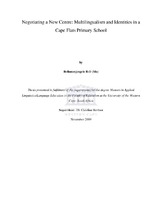Negotiating a new centre: multilingualism and identities in a Cape Flats Primary School
Abstract
Meaning in human relations has always been based on inferred similarities (Holyoak & Thagard,1995). We are quick to liken the new to an old type. In this study, South African bi- or multilingual citizens post-1994 are perceived to hold the same ethno-linguistic perceptions as their progenitors. This explains the growing amount of literature on bilingual language ideology which is dissected upon the language attitude and space table. Following the same line but from a different perspective, Rampton (1995, 1999, 2003) discusses the relativity involved in labelling a bi- or multilingual repertoire. He suggests that the performative act of a bilingual through his/her linguistic repertoire should be structured according to expertise (instrumental), affiliation(integration) or inheritance (ethnicity). Starting with a note on the attitudinal myth, and closing with possible implications for various educational strata, the research explores Rampton’s notions in a rapidly changing educational context and proposes a revised understanding of ‘appellation’ as a complementary concept, an agentive and non-essentialist form of approaching bi- or multilingual identity enactment. It asserts that each enactment is informed by and carries an element of one or all the other facets of the bi-or multilingual multiply identity. Central to the study’s argument is that a bi-or multilingual is not oblivious of the socio-cultural elements that come with each linguistic capital. So, while earlier literature on identity views appellation as ‘other- ascribed’ identity, this study defines appellation as the construction of ‘self’ using all the elements provided by one’s linguistic basket.Further, with its innovative use of spoken interactional data, the study is able to contribute to the ongoing research on the appropriate medium of instruction in the South African educational system. With a special focus on the primary stage, the study sheds light on the fluidity of bi- or multilingual identity formation and enactment inside and outside the classroom. It uses an analytical framework based on Conversation Analysis, the Ethnography of Speaking, Systemic Functional Linguistics, and Critical Discourse Analysis to test the fit of Rampton’s original categories of inheritance, expertise, and affiliation with learners’ actual conversations.In all, the study in a linguistically substantiated stance, argues for more situated perspectives on the mother tongue based educational policy.

